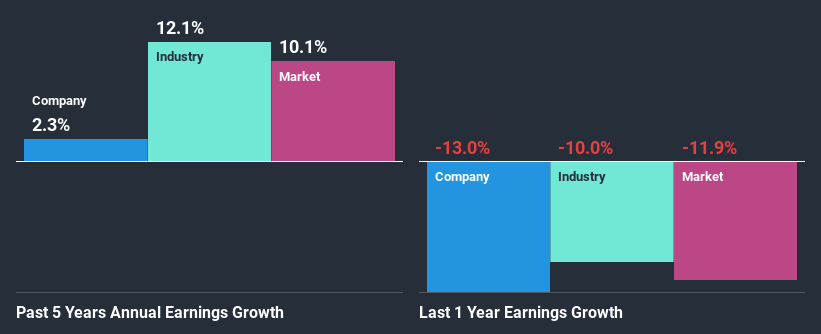- United Kingdom
- /
- Insurance
- /
- LSE:DLG
Has Direct Line Insurance Group plc (LON:DLG) Stock's Recent Performance Got Anything to Do With Its Financial Health?
Most readers would already know that Direct Line Insurance Group's (LON:DLG) stock increased by 6.2% over the past three months. Given that stock prices are usually aligned with a company's financial performance in the long-term, we decided to investigate if the company's decent financials had a hand to play in the recent price move. In this article, we decided to focus on Direct Line Insurance Group's ROE.
Return on equity or ROE is a key measure used to assess how efficiently a company's management is utilizing the company's capital. In other words, it is a profitability ratio which measures the rate of return on the capital provided by the company's shareholders.
View our latest analysis for Direct Line Insurance Group
How To Calculate Return On Equity?
Return on equity can be calculated by using the formula:
Return on Equity = Net Profit (from continuing operations) ÷ Shareholders' Equity
So, based on the above formula, the ROE for Direct Line Insurance Group is:
12% = UK£367m ÷ UK£3.0b (Based on the trailing twelve months to December 2020).
The 'return' is the yearly profit. One way to conceptualize this is that for each £1 of shareholders' capital it has, the company made £0.12 in profit.
What Has ROE Got To Do With Earnings Growth?
Thus far, we have learned that ROE measures how efficiently a company is generating its profits. Based on how much of its profits the company chooses to reinvest or "retain", we are then able to evaluate a company's future ability to generate profits. Assuming everything else remains unchanged, the higher the ROE and profit retention, the higher the growth rate of a company compared to companies that don't necessarily bear these characteristics.
Direct Line Insurance Group's Earnings Growth And 12% ROE
To begin with, Direct Line Insurance Group seems to have a respectable ROE. Further, the company's ROE is similar to the industry average of 11%. Direct Line Insurance Group's decent returns aren't reflected in Direct Line Insurance Group'smediocre five year net income growth average of 2.3%. We reckon that a low growth, when returns are moderate could be the result of certain circumstances like low earnings retention or poor allocation of capital.
We then compared Direct Line Insurance Group's net income growth with the industry and found that the company's growth figure is lower than the average industry growth rate of 12% in the same period, which is a bit concerning.

Earnings growth is an important metric to consider when valuing a stock. The investor should try to establish if the expected growth or decline in earnings, whichever the case may be, is priced in. This then helps them determine if the stock is placed for a bright or bleak future. Is DLG fairly valued? This infographic on the company's intrinsic value has everything you need to know.
Is Direct Line Insurance Group Efficiently Re-investing Its Profits?
The high three-year median payout ratio of 64% (that is, the company retains only 36% of its income) over the past three years for Direct Line Insurance Group suggests that the company's earnings growth was lower as a result of paying out a majority of its earnings.
Additionally, Direct Line Insurance Group has paid dividends over a period of eight years, which means that the company's management is determined to pay dividends even if it means little to no earnings growth. Our latest analyst data shows that the future payout ratio of the company is expected to rise to 82% over the next three years. However, Direct Line Insurance Group's future ROE is expected to rise to 19% despite the expected increase in the company's payout ratio. We infer that there could be other factors that could be driving the anticipated growth in the company's ROE.
Summary
On the whole, we do feel that Direct Line Insurance Group has some positive attributes. Yet, the low earnings growth is a bit concerning, especially given that the company has a high rate of return. Investors could have benefitted from the high ROE, had the company been reinvesting more of its earnings. As discussed earlier, the company is retaining a small portion of its profits. Having said that, looking at the current analyst estimates, we found that the company's earnings are expected to gain momentum. To know more about the company's future earnings growth forecasts take a look at this free report on analyst forecasts for the company to find out more.
If you’re looking to trade Direct Line Insurance Group, open an account with the lowest-cost* platform trusted by professionals, Interactive Brokers. Their clients from over 200 countries and territories trade stocks, options, futures, forex, bonds and funds worldwide from a single integrated account. Promoted
New: Manage All Your Stock Portfolios in One Place
We've created the ultimate portfolio companion for stock investors, and it's free.
• Connect an unlimited number of Portfolios and see your total in one currency
• Be alerted to new Warning Signs or Risks via email or mobile
• Track the Fair Value of your stocks
This article by Simply Wall St is general in nature. It does not constitute a recommendation to buy or sell any stock, and does not take account of your objectives, or your financial situation. We aim to bring you long-term focused analysis driven by fundamental data. Note that our analysis may not factor in the latest price-sensitive company announcements or qualitative material. Simply Wall St has no position in any stocks mentioned.
*Interactive Brokers Rated Lowest Cost Broker by StockBrokers.com Annual Online Review 2020
Have feedback on this article? Concerned about the content? Get in touch with us directly. Alternatively, email editorial-team (at) simplywallst.com.
About LSE:DLG
Direct Line Insurance Group
Provides general insurance products and services in the United Kingdom.
Mediocre balance sheet low.
Similar Companies
Market Insights
Community Narratives



